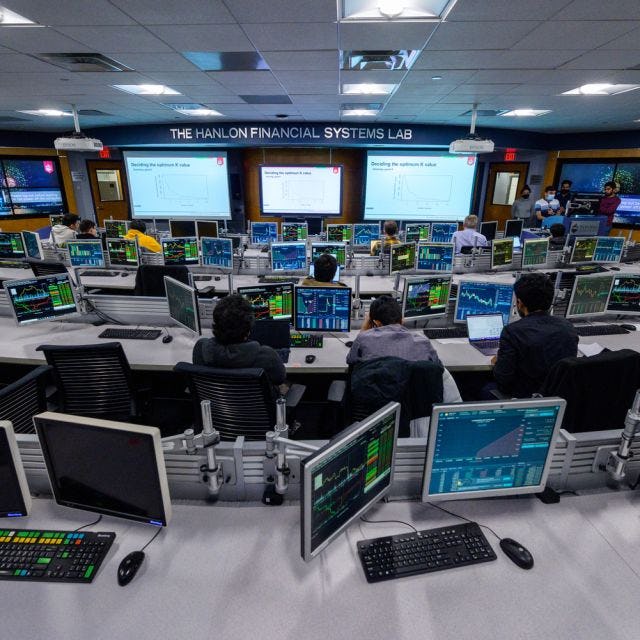
Master's in Financial Technology and Analytics
Today's financial industry is driven by technology, and the rise of fintech makes it essential for professionals to have expertise in areas such as financial technology, analytics, data science and advanced analytical modeling.
Program Highlights
Job Ready from the Start: Our master’s degree in Financial Technology and Analytics is designed with an ever-evolving, leading-edge curriculum that equips students with the skills and knowledge sought after by top employers in the finance industry. The program's real-world relevance ensures graduates are job-ready from day one. Stevens alumni have built a solid foundation of excellence that future graduates are prepared to build on.
Wall Street Tools: Students gain hands-on experience with the latest technologies used by Wall Street firms and global financial institutions, providing them with a competitive edge in the job market. The program's emphasis on practical application ensures seamless integration into dynamic finance roles.
Personalized Path, Tailored Success: The program culminates in a capstone consulting or research experience, allowing you to apply your knowledge to real-world scenarios. With the guidance of a dedicated faculty advisor, you'll customize your degree through a strategic selection of electives. This personalized approach ensures your educational journey is tailored to your goals, setting you on the path to success.
Powerful Professional Networks: Experienced faculty members maintain close ties with the finance industry, enabling them to connect students with valuable professional networks and discover opportunities that align with their individual interests and career aspirations. This personalized approach helps ensure a smooth transition from academia to the workforce.
The Heart of Global Finance: Located so close to the financial capital of the world, New York City, Stevens provides students with unparalleled access to industry leaders, networking events and real-world finance experiences. Our strategic location offers a competitive advantage for students seeking to launch successful careers in the heart of global finance.
Meta-Learning for a Competitive Edge: Develop invaluable meta-learning skills through our innovative curriculum, including the FA800 course, which fosters research abilities, communication prowess and interest in result-oriented techniques. By mastering the art of breaking down complex issues swiftly to create data-driven solutions, gaining insights into thinking processes, attitudes, motivation, and decision-making contexts, you'll cultivate a meta-learning mindset that has become increasingly crucial in the digital era.
Forging the Future of Fintech: A collaboration between Stevens and Rensselaer Institute of Technology (RPI), The Center for Research toward Advancing Financial Technologies (CRAFT) was the first fintech-focused Industry University Cooperative Research Center (IUCRC) funded by the National Science Foundation. The Center offers students an amazing opportunity to delve into research in the rapidly evolving world of financial technology and to network with other academics and industry professionals.
GMAT/GRE test scores are optional for all master’s programs. Applicants who think that their test scores reflect their potential for success in graduate school may submit scores for consideration.
Data Science, Technology and Analytics for Wall Street
At Stevens, financial analysts combine their programming skills with talents in data analysis and statistics to design innovative solutions to financial problems. Financial Analysts also use excellent business and communication skills to assess client needs and make recommendations to executive teams.
The Financial Technology and Analytics Master's degree is designed for STEM students who are looking to pursue careers in the financial industry. The program covers a range of topics in financial technology and data science, including financial technology, blockchain technologies and decentralized finance, digital payment technologies and trends, applied statistics with applications in finance, introduction to financial risk management, and time series with applications to finance or advanced financial econometrics.
Graduates of our program will be well-equipped to lead financial technology and data science teams in both start-ups and established financial firms. They will be able to build advanced analytical models, make enterprise data analytics decisions, and orchestrate advanced financial systems technology resources in a cloud-based data-driven distributed environment. Graduates will also have the skills to construct innovative financial products and apply their expertise to a range of general financial services analytics.
Our Financial Technology and Analytics faculty are experts in the field and are constantly exploring new concepts in machine learning, data modeling, and optimization in finance. Students will have the opportunity to learn from these fintech professionals and work with the data analysis and visualization tools used on Wall Street in our state-of-the-art financial labs.
The Impact of AI on Financial Technology and Analytics
Artificial Intelligence is redefining the Financial Technology and Analytics curriculum at Stevens Institute of Technology, transforming how students approach data-driven decision-making, risk assessment and financial modeling. As AI automates complex financial processes, the Stevens STEM-designated program is evolving to equip students with machine learning, predictive analytics and blockchain expertise to revolutionize the FinTech industry.
At Stevens, AI is not just a tool; it’s a fundamental part of the learning experience. Students engage with AI-powered trading algorithms, fraud detection models and automated risk management systems, gaining hands-on experience in real-time market analysis and financial forecasting. Through leading-edge resources like the CRAFT FinTech Research Center, industry partnerships and experiential learning in advanced financial labs, the program continually adapts to ensure graduates are prepared for the AI-driven future of finance. By integrating AI into every facet of FinTech and analytics, Stevens is shaping the next generation of financial innovators.
Fintech Careers
Data Analyst
Data Engineer
Financial Specialist
Quantitative Researcher
Quantitative Risk Analyst
Risk Management Analyst
Trading Analyst
Organizations hiring Financial Technology and Analytics graduates include companies such as: Alphabet, American Express, Barclays, BlackRock, Brown Brothers Harriman, Citi, Deloitte, Deutsche Bank, Intuit, JP Morgan Chase Co, KPMG, Metlife, Morgan Stanley, PNC Bank, Societe Generale, UBS and more.
Admissions Criteria
Admission to the Financial Technology and Analytics master’s degree is competitive. GMAT and GRE scores are optional, but candidates applying to this program with strong scores are encouraged to submit them with their application. To be considered for this program, your application must include the following.
Experience Recommended
You may apply to the Financial Technologies and Analytics program without any work experience, but students without work experience will need excellent academic credentials from their undergraduate work, with a degree in statistics, mathematics, physics, engineering, or another math or science discipline.
For finance professionals interested in working in an analyst capacity, work experience is preferred. To keep up with the technical nature of the coursework, computer science and statistics skills also are required.
A list of general Stevens admissions criteria is available at Graduate Academics & Student Success.
Academic Transcripts
Your application must include official transcripts from all universities you have attended. These records must show your name, the name of the university attended, enrollment dates, coursework completed, and grades assigned.
Professional Resume
You must include a résumé with your application that highlights:
Academic record
Work and internship experience
Leadership abilities
Interviews
Stevens often invites master's candidates to interview prior to making an admissions decision. If you are selected for an interview after submitting your application, you will receive instructions via email.
Letters of Recommendation
Your application must include two letters of recommendation. The strongest applications will include one letter from a current supervisor, and one from a former supervisor or previous employer who can speak to your leadership potential and discuss your professional performance.
Ideal candidates for the Financial Technology and Analytics program will have a strong background in statistics, mathematics, physics, engineering or a related discipline, or will have several years of experience working in finance with an interest in exploring these disciplines in great depth.
Application Deadlines
APPLICANT | FALL | SPRING | SUMMER (Domestic Applicants Only) |
|---|---|---|---|
Master's Full-Time | April 15 | November 1 | May 1 |
Master's Part-Time | August 15 | January 1 | May 1 |
Graduate programs admit students on a "rolling" basis, meaning that students may still apply after the preferred deadlines.
Students requiring an F1 Visa are strongly encouraged to apply by the preferred deadlines to allow time for visa processing.
The Technology and Financial Analytics master's degree has two concentrations:
• The Financial Data Science concentration focuses on Data Analysis and Machine Learning applications to Finance.
• The Financial Technology concentration is focused on the newest technology emerging in recent years.
As a graduate student, you are required to choose one of the concentrations and additionally customize your degree with a set of four elective courses, including the chance to pursue a structured specialization tailored to your career interests. A close collaboration between you and your faculty advisor will help you select the right classes for your future.
The Technology and Financial Analytics master's program at Stevens is available on campus or fully online.
Core Courses
These 9 credits are required for both concentrations. The students will learn fundamental data techniques, SQL, as well as machine learning techniques. FA582 and FE513 are first semester classes, while the capstone FA800 is to be completed in the last semester.
FA 582 Foundations of Financial Data Science - 2 Credits
This course provides an overview of issues and trends in data quality, data storage, data scrubbing and data flows. Topics include data abstractions and integration, enterprise-level data issues, data management issues, similarity and distances, clustering methods, classification methods, text mining, and time series. Furthermore, the Hadoop-based programming framework for big data issues will be introduced, along with any governance and policy issues.
Corequisite: FE 513
FE 513 Practical Aspects of Database Design - 1 Credit
The course introduces required techniques and fundamental knowledge in data science techniques. It familiarizes students with database and data analysis tools, teaching them to manage databases and solve financial problems using R.
FA 590 Statistical Learning in Finance - 3 Credits
This course provides an applied overview of both classical linear approaches to statistical learning and more modern statistical methods. The classical linear approaches include logistic regression, linear discriminant analysis, k-means clustering and nearest neighbors, while modern approaches include generalized additive models, decision trees, boosting, bagging and support vector machines.
FA 800 Project in Financial Analytics - 3 Credits
This course is designed for students undertaking a research or analytical project either individually or as a group. The goal of this course is to train students' ability to work on a research-oriented project in a group environment, and also train their professional presentation and scientific writing skills.
Financial Technology and Analytics Concentrations
The students in the M.S. in Financial Technology and Analytics are required to choose one of the following two concentrations. Please expand to see the courses in each concentration.
Financial Technology Concentration
The Fintech concentration is focused on decentralized finance, blockchain, and digital payment systems.
FA 591 - Blockchain Technologies and Decentralized Finance (3)
The course will introduce concepts of Blockchain technologies as they apply to decentralized finance. The course starts with cryptocurrency and advances the concept of smart contracts as they apply to financial instruments. The course is technical and requires knowledge of programming in Python as well as financial instruments and concepts. Programming in solidity is learned throughout the class. The course discusses risk management concepts, stable coins as well as how regulations may impact the area.
FA 595 - Financial Technology (3)
This course deals with the networking and machine-learning technologies underlying activities of markets, institutions and participants. The overall purpose is to give students a working understanding of a wide variety of the technological tools that permeate modern life. The successful student will be able to extend this knowledge, understand systems currently in place and use new developments in the field as they are created.
FA 690 - Machine Learning in Finance (3)
This course focuses on advanced machine learning models and their applications to finance. Building on fundamental statistical learning theory, the course covers advanced topics in classification, supervised learning, unsupervised learning, latent space models, graphical models, mixture models, online learning, deep learning, and big-data analytics. Learning and building from financial data sets, the lectures will introduce machine learning models in quantitative investing, portfolio management, algorithmic trading, risk management, client-relationship management, and beyond. A final project on related topics is required.
Financial Data Science Concentration
The Financial Data Science concentration is focusing on automating financial advising with Data Analytics, and managing exposure to financial risk.
FA 541 - Applied Statistics with Applications in Finance (3)
The course prepares students to employ essential ideas and reasoning of applied statistics. Topics include data analysis, data production, maximum likelihood, method of moments, Bayesian estimators, hypothesis testing, tests of population, multivariate analysis, categorical data analysis, multiple regression, analysis of variance, nonlinear regression, risk measures, bootstrap methods and permutation tests. The course is designed to familiarize students with statistical software needed for analysis of the data. Financial applications are emphasized but the course serves areas of science and engineering where statistical concepts are needed. This course is a graduate course and is covering topics for a deeper understanding than undergraduate courses such as MA331 and BT221. Furthermore, the course will cover fundamental statistical topics which are the basis of any advanced course applying statistical notions such as MGT718, BT652 as well as courses on machine learning, knowledge discovery, big data, time series, etc.
FE 535 - Introduction to Financial Risk Management (3)
This course deals with risk management concepts in financial systems. Topics include identifying sources of risk in financial systems, classification of events, probability of undesirable events, risk and uncertainty, risk in games and gambling, risk and insurance, hedging and the use of derivatives, the use of Bayesian analysis to process incomplete information, portfolio beta and diversification, active management of risk/return profile of financial enterprises, propagation of risk, and risk metrics.
FA 542 - Time Series with Applications in Finance (3)
In this course the students will learn how to estimate financial data model and predict using time series models. The course will cover linear time series (ARIMA) models, conditional heteroskedastic models (ARCH type models), non-linear models (TAR, STAR, MSA), non-parametric models (kernel regression, local regression, neural networks), non-parametric methods of evaluating fit such as bootstrap, parametric bootstrap and cross-validation. The course will also introduce multivariate time series models such as VAR.
Capstone Course or Master's Thesis
Financial Technology and Analytics students are required to complete a significant project as part of their Master's experience. They can choose to complete the FA 800 Project in Financial Analytics during their final semester. They would work in teams often on projects offered by our industry partners.
Alternatively, the students may complete a thesis option. This means completing FA900 over two consecutive semesters. The project is going to be individual and will prepare the students in case they wish to pursue a Ph.D. degree in Data Science.
FA 800 Project in Financial Analytics - 3 Credits
This course is designed for students undertaking a research or analytical project either individually or as a group. The goal of this course is to train students' ability to work on a research-oriented project in a group environment, and also train their professional presentation and scientific writing skills.
FA 900 Master's Thesis in Financial Analytics - 3 Credits
A minimum of six credit hours is required for the thesis. Hours and credits to be arranged. You will need both an advisor and a reader to complete this course; interested students should contact their academic advisor for complete details.
Meet the Program Director
Ionut Florescu is a research professor in financial engineering and the Director of the Hanlon Financial Systems Lab at Stevens. His research interest is concentrated primarily in the area of stochastic processes and applications to finance; however his work is about applying sound mathematical modeling techniques to any area of science and engineering. He has authored or co-authored four books and published 47 book chapters and journal articles. Ionut has worked at Stevens since 2005 since obtaining his Ph.D. in statistics from Purdue University. His education includes a bachelor’s degree in mathematics and a master’s in stochastic processes (1997) from the University of Bucharest, Romania as well as a master’s in computational finance from Purdue University.
Frequently Asked Questions (FAQs)
What is Financial Technology and Analytics?
Financial Technology and Analytics combines the technical expertise of FinTech with the analytical power of data science. Students enrolled in this graduate program learn how to apply advanced analytics to financial systems, helping organizations make data-driven decisions about their financial operations.
This program prepares students to not only develop financial technologies but also analyze the data these technologies generate, providing insights that help organizations optimize their financial strategies.
What Do Financial Technology and Analytics Graduates Do?
Financial Technology and Analytics graduates are skilled in both financial technology and analytics. Their responsibilities include developing financial software and using data analysis to inform financial decision-making. They may work on projects that involve building algorithms for investment strategies, analyzing transaction data or improving financial system efficiency.
These professionals are key to helping organizations leverage data for better financial outcomes, blending technological innovation with data-driven strategies to optimize financial operations.
How Long Does it Take to Complete This Program?
The program can be completed in 12–18 months full-time or part-time for working professionals.
Can I Work Full-Time While Completing This Program?
Yes! The program offers part-time flexibility, allowing students to balance work, study, and internships.
What Makes This Degree Different From A Traditional Finance or Data Science Degree?
This program uniquely blends financial analytics, FinTech, AI, blockchain and machine learning, whereas traditional finance degrees focus on financial principles and data science degrees emphasize general AI applications.
What Industries Hire Financial Technology and Analytics Graduates?
Graduates work in:
Investment Banking
Hedge Funds
FinTech Startups
Risk Management
Why Choose the Financial Technology and Analytics Master's at Stevens?
No GMAT/GRE Required
Flexible Learning Options
Hands-On Learning in Financial Labs
NYC & Wall Street Advantage
Top-Tier Job Placement & High Salaries
Cutting-Edge FinTech & AI Curriculum
You May Recognize This Program As...
MFTA
FinTech and Analytics
Financial Technology and Data Analytics
Master of Science in FinTech and Analytics
Financial Data Science
Financial Analytics
Finance and Technology
Applied FinTech and Analytics
Quantitative Finance and FinTech
Finance, Technology, and Data Analytics
FinTech and Data Science
Computational Finance and Analytics
AI and Machine Learning in Finance
Data-Driven Financial Technology























